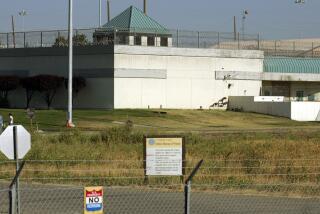NORTHERN IRELAND : Bars Are No Barrier to Violence
- Share via
BELFAST, Northern Ireland — The Protestant prisoners of Belfast’s Crumlin Road Jail had just sat down together for their Sunday supper. For those unlucky few sitting too close to the bomb, it would be their last.
A package hidden earlier by Irish Republican Army inmates blew apart the dining hall, killing two loyalists and wounding seven more in Northern Ireland’s main prison for terrorist suspects awaiting trial.
This Nov. 24 incident capped a bitter and bloody showdown taking place behind the bars of Crumlin Road, where the prison’s warring Roman Catholic and Protestant factions, housed in the same wings, are stepping up efforts to bludgeon each other and the British authorities into segregating them.
“The IRA’s ability to detonate a bomb in a high-security prison and kill people--obviously it is a major source of embarrassment for us,” said a senior prison official who, as a potential target for assassins, requires anonymity.
Security sources believe that bomb-making materials were smuggled in by visitors.
Killed in the blast was 27-year-old Robert Skey. A member of the loyalist Ulster Defense Assn., Skey had been accused of severely beating and trying to abduct a Catholic pedestrian a year ago in the sectarian battleground of north Belfast.
A second loyalist, Colin Caldwell, later died from his wounds. He was buried this week amid supporters of the outlawed Ulster Volunteer Force, a secret paramilitary group that kills Catholics in tit-for-tat retaliation for IRA killings. Caldwell had been awaiting trial on his alleged UVF membership and for an abortive murder attempt.
When both deaths were announced within the “Crum,” as locals call the overcrowded Victorian structure, republican prisoners are reported to have cheered their success.
The coal-stained jail now houses more than 500 prisoners in three categories: republicans who seek to force the British out of Northern Ireland at the point of a gun; loyalists, who attack Catholics they deem “republicans” in the aim of maintaining the Protestant-majority state, and others charged with non-terrorist offenses, known universally as “ODCs,” or “Ordinary Decent Criminals.”
The explosion marked the greatest outrage in two years of regular confrontations between the two sides, who share the goal of pushing the prison authorities into making their separation formal and complete. Their combined campaign has left about 80 guards and an unknown number of inmates injured this year.
In practice, loyalists and republicans already have agreed among themselves to a longstanding system called “good days and bad days,” which involves alternating the use of the gym and dining areas--a move agreed upon after several fistfights and plots to place poison and ground-up glass in individuals’ food. This “self-segregation,” it must be noted, made the dining loyalists a better target for the IRA.
Loyalist commanders outside the jail have threatened to kill Crumlin guards if their side’s prisoners are not better protected. Four guards were badly beaten during loyalist-led riots in September that left the prison’s chapel wrecked and a dining hall in flames. Another senior warder was nearly blinded when a republican inmate poured scalding water onto him from above.
The British resistance to separating Crumlin Road republican and loyalist extremists--working-class toughs weaned on more than two decades of conflict who on the streets of Belfast intermittently try to assassinate each other--has baffled some observers and driven local politicians into an unusual unity.
“It’s time the British government’s stubbornness ended and they yielded to common sense,” said Nigel Dodds, lord mayor of Belfast. Dodds is a leading member of the loyalist Democratic Unionist Party.
The government has launched two inquiries into jail policy in the aftermath of the cafeteria blast.
“It’s a madhouse in there,” said Anne, the sister of a loyalist caught with a gun. “It’s never been worse.”
More to Read
Sign up for Essential California
The most important California stories and recommendations in your inbox every morning.
You may occasionally receive promotional content from the Los Angeles Times.











